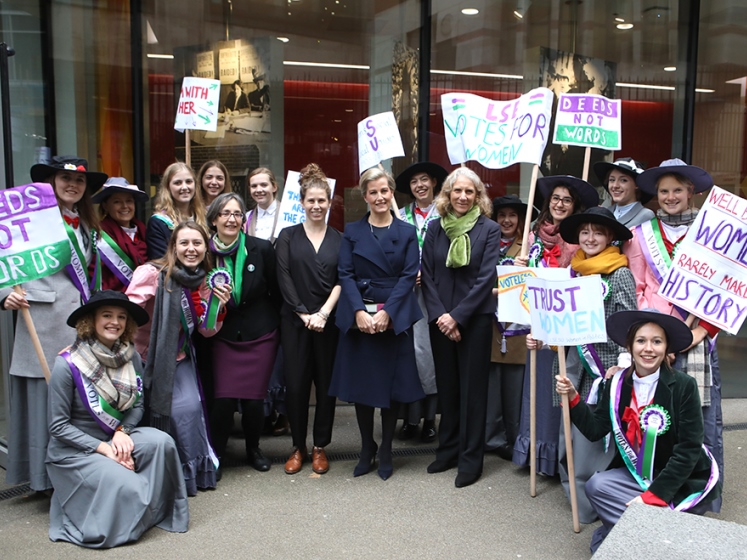 LSESU Women in Politics Society join special guests for the renaming. Nigel Stead
LSESU Women in Politics Society join special guests for the renaming. Nigel Stead
LSE has officially renamed three of its key campus buildings after central figures in the British suffrage movement.
The buildings on Clement’s Inn are now Pankhurst House, Fawcett House and Pethick-Lawrence House after the suffrage campaigners Emmeline Pankhurst, Millicent Garrett Fawcett and Emmeline Pethick-Lawrence, who all have connections to the area.
Formerly known as ‘The Towers’, the three buildings are on the same site as the London headquarters of the Women Social and Political Union, founded by Emmeline Pankhurst and supported by Emmeline Pethick-Lawrence. The current LSE campus was also host to the suffragette meeting place the Tea Cup Inn; the St Clement Press, which published Votes for Women, and the London Opera House, where larger suffrage campaign meetings were held.
Around the corner, the Women’s Library at LSE holds the foremost suffrage collection in the UK, hosting the papers of campaigner Millicent Garrett Fawcett and the Fawcett Society, alongside a range of documents, pamphlets and objects relating to the historical struggle.
The newly-titled buildings were unveiled in a ceremony by HRH The Countess of Wessex on Friday 23 November. The event also featured contributions from author, activist and former LSE student, Caroline Criado Perez, alongside former LSE visiting professor and great-granddaughter of Emmeline Pankhurst, Dr Helen Pankhurst. The change of name is part of the wider activities of LSE to mark 100 years since the extension of suffrage in Britain, when the first women won the right to vote in parliamentary elections.
In advance of the renaming event, LSE Pro-Director for Research Professor Julia Black commented, “LSE is closely connected with the suffrage movement in many ways: with our history, our location, the extensive material of our library and our wide-ranging research into inequality. We are delighted to be able to strengthen this connection further, while celebrating a landmark moment in gender equality and political history.”
Coinciding with the renaming, the School is currently hosting the ’Make a Stand’ exhibition in its Atrium gallery, courtesy of the Mayor of London, featuring life-sized images of 59 women and men who fought for female suffrage.